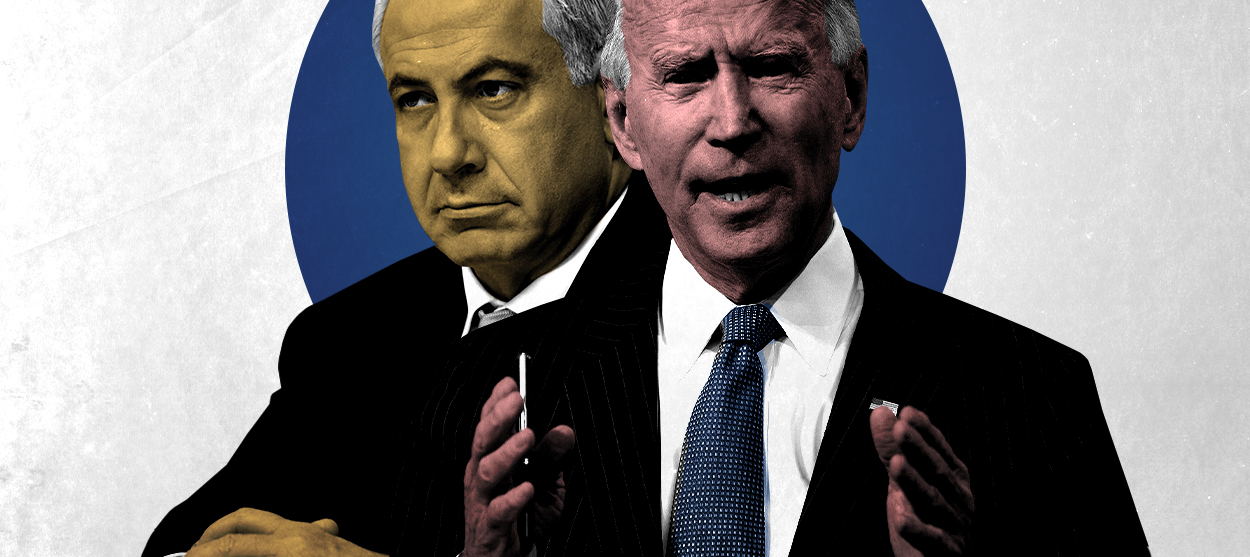Israel is testing Biden
Who's in charge of American diplomacy?


A free daily email with the biggest news stories of the day – and the best features from TheWeek.com
You are now subscribed
Your newsletter sign-up was successful
The Biden administration and Iran have made some halting steps toward patching up the nuclear deal that Donald Trump tore up. Talks are proceeding in Vienna, and while there is a great deal of mistrust (entirely justified on the Iranian side, thanks to how Trump betrayed America's promises), slow progress is reportedly being made.
That is almost certainly why Israel launched an attack on an Iranian nuclear facility this week. The Natanz uranium enrichment plant was hit by an explosion on Sunday, which intelligence officials told The New York Times was carried out by Israeli forces. The intent was plainly to dynamite the Vienna talks, and sure enough, Iran announced in retaliation that it would increase its current target of uranium enrichment from 20 percent to 60 percent.
The Israeli government, still headed for the moment by Benjamin Netanyahu, thinks it can push President Biden around — and it might be right.
The Week
Escape your echo chamber. Get the facts behind the news, plus analysis from multiple perspectives.

Sign up for The Week's Free Newsletters
From our morning news briefing to a weekly Good News Newsletter, get the best of The Week delivered directly to your inbox.
From our morning news briefing to a weekly Good News Newsletter, get the best of The Week delivered directly to your inbox.
Sticking a thumb in America's eye right as it is starting up delicate, sensitive negotiations is entirely typical of Netanyahu's arrogance in general and his hyper-belligerent approach to Iran in particular. This is a guy who personally meddles in American elections (in favor of Republicans, including Donald Trump), thinks that "In the Middle East, there is no threat that is more serious, more dangerous, more pressing than that posed by the fanatical regime in Iran," and who went behind President Obama's back to directly persuade Congress to halt the Iran nuclear deal — a grave breach of diplomatic protocol that thankfully did not work. No other foreign leader would even dream about attempting that kind of stunt.
Netanyahu is a guy who falsely asserted before Congress in 2002 that "there is no question whatsoever" that Saddam Hussein was working on nuclear weapons, and has falsely predicted over and over and over for almost 30 years that Iran was very close to building a nuke — part of a blatant years-long effort to bait or trick the U.S. into invading Iran for him. (Meanwhile, Israel is the only country in the Middle East that actually does possess a nuclear arsenal.)
The Israeli government clearly thinks it can interfere with America's pursuit of its strategic interests without risking a diplomatic breach or Israel's enormous subsidies from the American state. And it's easy to see why — it has done so repeatedly for years, and gotten away with it every time. Even while Netanyahu treated President Obama with flippant contempt and constantly threw sand in the gears of diplomacy with Iran, Israel continued to receive billions in American cash and (with rare exceptions) free use of the American veto on the U.N. Security Council.
A full accounting of why Israel enjoys such latitude is beyond the scope of this article. But it certainly has something to do with the large caucus of die-hard Israel supporters in both political parties. On the Democratic side, Speaker of the House Nancy Pelosi, Senate Majority Leader Chuck Schumer, and Biden himself have long been indulgent partisans of Israel, viewing it as the region's only democracy and a key ally. There are even more zealous views among Republicans, many of whom are evangelical Christians who believe that Israel validates a wild prophecy in the Book of Revelation. (How to reconcile Israeli "democracy" with the de facto and increasingly de jure apartheid system that leaves 4.8 million Palestinians with no representation in the government that rules them through merciless violence somehow goes unaddressed in this thinking.)
A free daily email with the biggest news stories of the day – and the best features from TheWeek.com
If I had to guess, I would expect that Biden will also let Israel get away with striking Iran once again. That would fit with his history, and reining in Israel (by threatening to cut off Israel's aid or use of the Security Council veto, for instance) would cause a lot of political headaches at home.
On the other hand, Israel meddling with these negotiations is probably intensely irritating to U.S. diplomats. The Biden administration reportedly would very much like to tie up the Iran situation so that it can turn its attention elsewhere. Time is also short — new elections are coming up soon in Iran, in which the moderate pro-diplomacy faction might lose to conservatives. (It's a reasonable supposition that Israel would like that to happen.)
And the fact is Israel depends utterly on U.S. protection. It is deeply unpopular across the world, and without America's Security Council veto might well have been subject to economic sanctions by now over the occupation of the Palestinian territories and ongoing land theft there. It's just barely possible that Netanyahu has gone too far this time. If Biden does decide he's not going to tolerate these antics, Netanyahu will have no one to blame but himself.
Editor's note: This article was previously illustrated by a collage that mixed the Israeli flag with a photo of Biden in a way that was insensitive and offensive. The website often creates illustrations that combine flags with important political figures, but we should have been much more attuned to the symbolism in this case. The image has been replaced and we apologize unreservedly.
Ryan Cooper is a national correspondent at TheWeek.com. His work has appeared in the Washington Monthly, The New Republic, and the Washington Post.
-
 5 cinematic cartoons about Bezos betting big on 'Melania'
5 cinematic cartoons about Bezos betting big on 'Melania'Cartoons Artists take on a girlboss, a fetching newspaper, and more
-
 The fall of the generals: China’s military purge
The fall of the generals: China’s military purgeIn the Spotlight Xi Jinping’s extraordinary removal of senior general proves that no-one is safe from anti-corruption drive that has investigated millions
-
 Why the Gorton and Denton by-election is a ‘Frankenstein’s monster’
Why the Gorton and Denton by-election is a ‘Frankenstein’s monster’Talking Point Reform and the Greens have the Labour seat in their sights, but the constituency’s complex demographics make messaging tricky
-
 How Iran protest death tolls have been politicised
How Iran protest death tolls have been politicisedIn the Spotlight Regime blames killing of ‘several thousand’ people on foreign actors and uses videos of bodies as ‘psychological warfare’ to scare protesters
-
 The Board of Peace: Donald Trump’s ‘alternative to the UN’
The Board of Peace: Donald Trump’s ‘alternative to the UN’The Explainer Body set up to oversee reconstruction of Gaza could have broader mandate to mediate other conflicts and create a ‘US-dominated alternative to the UN’
-
 Israel’s E1 zone in the West Bank: the death of the two-state solution?
Israel’s E1 zone in the West Bank: the death of the two-state solution?The Explainer Controversial new settlement in occupied territories makes future Palestinian state unviable, critics claim
-
 ‘The security implications are harder still to dismiss’
‘The security implications are harder still to dismiss’Instant Opinion Opinion, comment and editorials of the day
-
 The billionaires’ wealth tax: a catastrophe for California?
The billionaires’ wealth tax: a catastrophe for California?Talking Point Peter Thiel and Larry Page preparing to change state residency
-
 What have Trump’s Mar-a-Lago summits achieved?
What have Trump’s Mar-a-Lago summits achieved?Today’s big question Zelenskyy and Netanyahu meet the president in his Palm Beach ‘Winter White House’
-
 Bari Weiss’ ‘60 Minutes’ scandal is about more than one report
Bari Weiss’ ‘60 Minutes’ scandal is about more than one reportIN THE SPOTLIGHT By blocking an approved segment on a controversial prison holding US deportees in El Salvador, the editor-in-chief of CBS News has become the main story
-
 What is the global intifada?
What is the global intifada?The Explainer Police have arrested two people over controversial ‘globalise the intifada’ chants
